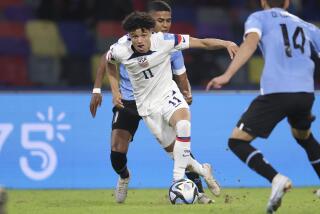WINTER OLYMPICS : Hockey : Opposing Teams Find Stopping Millen to Be Extremely Tall Order
- Share via
CALGARY, Canada — His name sits atop a list of the world’s finest Olympic hockey players. Ahead of the Soviet Union’s Million Ruble Line. Ahead of the choicest of Czechs, swiftest of Swedes, fastest of Finns, craftiest of Canadians.
But when the Olympics are over, Corey Millen, the shortest of Americans, will hang his skates over his shoulder, pack his sticks and head for the Alps. With 5 goals and 5 assists for 10 points, Millen is the leading scorer through four games of the Winter Olympics. He is a marked man for West German Coach Xaver Unsinn, who has vowed to assign a shadow to the Team USA center when the teams meet tonight in the game that will decide whether Team USA will advance to the medal round.
But the only statistic that matters, apparently, to the masterminds of the National Hockey League is Millen’s height. The son of a basketball player, Millen stands 5 feet 7 inches, leaving him short of his dad, Dick, by 8 inches. He’s perceived as too short for the NHL, and that’s the reason Millen is going to Switzerland to play for Ambri-Piotta, a club team there.
The New York Rangers hold draft rights to Millen, but after receiving only mild overtures from General Manager Phil Esposito, he chose to go to Europe. Millen thought the door might have been kicked open by other short Olympians, such as Mark Pavelich and Neil Broten, who have thrived in the NHL. But so far, at least, it hasn’t happened that way.
He’s about as popular there as he is in his native Cloquet, Minn., a town of about 12,000 near Minnesota’s Iron Range, that still hasn’t forgiven him for choosing to attend the big-city school, the University of Minnesota in Minneapolis, over the much closer University of Duluth.
“When I was in Sarajevo, I got an unbelievable amount of telegrams,” said Millen, who played for the ’84 U.S. team--and did not score a point--but chose to return, along with Scott Fusco, for another go-round in ’88.
“This time,” he said with a grin, “I’m not sure the people in Cloquet know I’m up here.”
If Cloquet isn’t clued in, the rest of the world has caught on.
“They knock his size,” said Tony Granato, who used to be his bitter rival at the University of Wisconsin but now skates alongside him, “but if you watch him, he doesn’t get hit.
“For his size, he’s incredibly strong. You won’t see him get knocked off his feet. . . . Why the NHL people don’t want him in the league is a mystery to me. There’s got to be a spot somewhere.”
That’s the way Millen always approached the game from the age of 4, even though his father would have preferred him to choose basketball.
“When I told him I wanted to skate, he said, ‘You really don’t want to do that,’ ” Millen said, “but I cried enough to make him change his mind. I couldn’t skate very well at first, but I loved it.”
They loved him back at the University of Minnesota, where he was the Gophers’ leading scorer twice, an All-American as a junior and team captain as a senior. More than once, he crossed sticks with Granato.
Millen’s first shot at the Olympics came just before his 20th birthday in Sarajevo, but like the rest of the team--which failed to make the medal round--he fired only blanks. In six games, he failed to collect a point.
This time, Millen is on the ice more than any U.S. skater, centering the team’s No. 1 line and the power-play unit, as well as being one of the team’s top penalty-killers.
Coach Dave Peterson, asked if there were a place for Millen in the NHL, said: “In my opinion, there is. Don’t say I said that he’d be a cinch in the NHL, but he’s good enough to play anyplace.
“He’s a talented player--a small player physically, so he’d have to go to a team that would use him in the correct way. You can’t expect him to go in the corners and let him get hammered by those big defensemen, but he is a very, very talented player.”
West Germany won three games, including an opening-game 2-1 upset of Czechoslovakia, before losing to the Soviet Union, 6-3, Friday. In that game, West Germany did not play its No. 1 goalie, Karl Friesen, a Canadian who once played a half season with the New Jersey Devils of the NHL.
“They’ll try to play herky-jerky, slow us down,” Peterson said. “They’re very talented, very clever, but they’re not as quick or as fast as we are.”
If the Soviet Union beats the Czechs today, Team USA must beat West Germany by at least two goals to advance to the medal round by a goal-differential formula. It’s possible that an empty-net goal scored by Dusan Pasek of the Czechs in the closing seconds of their 7-5 win against Team USA could keep the Americans out of the tournament.
“Then pulling the goaltender will have been a real . . . decision on my part,” Peterson said. “But in the minds of our players, if you had taken a vote of all the players, they would have voted to pull the goaltender.
“That’s our mentality. Sometimes, our mentality isn’t what it should be for international hockey.”
More to Read
Go beyond the scoreboard
Get the latest on L.A.'s teams in the daily Sports Report newsletter.
You may occasionally receive promotional content from the Los Angeles Times.






